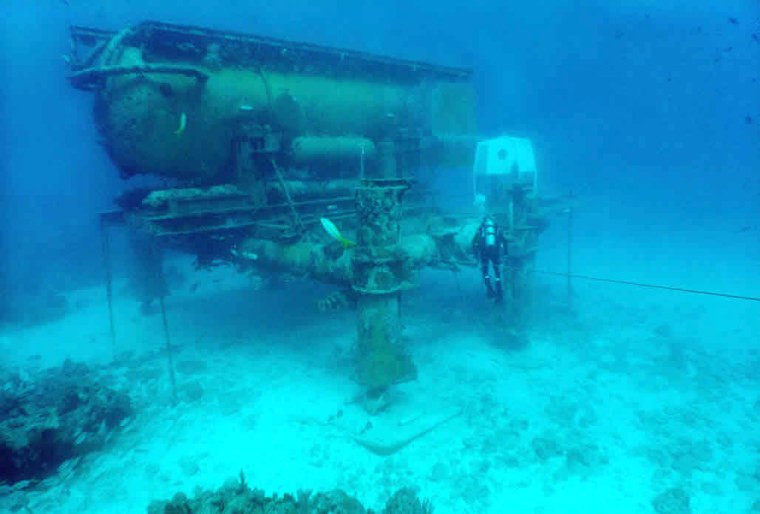The University of North Carolina at Wilmington may have to shut down its underwater research lab — the only one in the world — because of budget cuts to a program that helps pay for it.
The university manages the lab, a 400-square-foot (37-square-meter) capsule moored 63 feet (19.2 meters) below the surface off Key Largo, Fla. The federal government pays for its operation.
Financing for the National Oceanic and Atmospheric Administration's undersea research arm has been flat for years. Budgetary pressure accelerated this fiscal year when the National Undersea Research Program, or NURP, saw its budget fall from $13.5 million to $12 million. The budget proposed by President Bush recommends cutting an additional $1 million.
The university's lab, named Aquarius, gets about $1.3 million, which primarily covers operating and maintenance costs. Researchers, institutions and grants cover most of the mission expenses.
Aquarius lives for another year
NURP Director Barbara Moore said the agency considered cutting its money for Aquarius this year, but decided to continue the program. The agency can't continue to operate as normal on a budget that doesn't even keep up with inflation.
"This will be a watershed year for the National Undersea Research Program," said U.S. Rep. Mike McIntyre, D-N.C.
NASA astronauts have trained at the lab for several years to help them prepare for the rigors of space travel, sometimes spending a week or longer at a time.
"The beauty of Aquarius is not only is it isolated, but very isolated, and it's an extreme environment," said NASA project manager Bill Todd. "It also allows the crew to go on a real mission in a real environment and work with real scientists doing real work, just like they would in the space station."
This summer NASA will send four astronauts to test new communication methods and exercise equipment for long-duration space travel.
Federal support seen as essential
Steven Miller, director of the university's National Undersea Research Center, said Aquarius couldn't operate without the federal support.
"Without that funding, the program is pretty much dead in the water," he said from Key Largo.
Aquarius was built in 1986 but has been refurbished twice since its launch, but Miller said there are advantages to longevity.
"The fact we've been here in the Florida Keys for so long makes it an even more valuable as a research site, a long-term database that's unmatched anywhere else in the world," he said.
Researchers say Aquarius allows them to do in a few days what could otherwise take several weeks.
Mark Hay, a marine biologist with the Georgia Institute of Technology, spent 10 days in Aquarius last fall researching how herbivorous fish and other plant-eating animals affect seaweed growth on and around coral reefs.
"Our project required a lot of bottom time, and with Aquarius we could spend nine hours a day at the depths we needed to be at versus a few hours using a surface vessel," he said. "It provided an exceptional opportunity for us to see what goes on down there because we were out there so much."
Academic reputation
In addition to its research applications, Aquarius has helped boost the university's reputation.
"Having the world's only undersea laboratory as an extension of your program is great for our researchers and students and good exposure for our institution," said Mark Lanier, assistant to UNCW Chancellor Rosemary DePaolo.
Aquarius also has allowed the university's Center for Marine Science to attract world-leading researchers. That, in turn, allows its students to learn from some of the top scientists in their fields.
McIntyre says Aquarius is too important to let go.
"It's not like it's just a parochial project for our small area of the coast," Rep. McIntyre said. "The research that's done there has a national and international impact."
